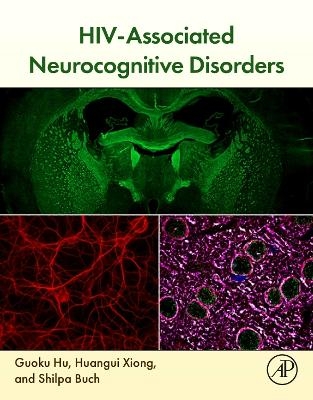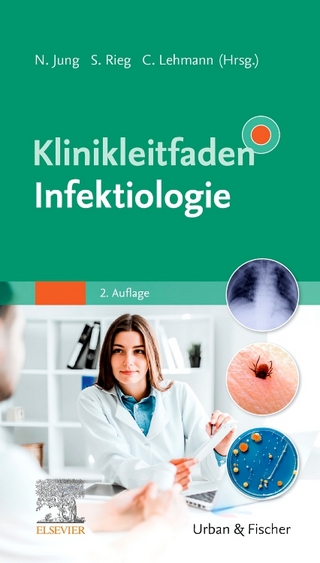
HIV-Associated Neurocognitive Disorders
Academic Press Inc (Verlag)
978-0-323-99744-7 (ISBN)
Dr. Hu is an Associate Professor in the Department of Pharmacology and Experimental Neuroscience at University of Nebraska Medical Center. His work is focused on mRNA biology, with the ultimate goal of elucidating their functional aspects in drug addiction, and also to identify novel therapeutic strategies that could enhance neuronal function and survival in patients afflicted with these disorders. Dr. Xiong is a Professor in the Department of Pharmacology and Experimental Neuroscience at University of Nebraska Medical Center and leader of the University of Nebraska Medical Center Neurophysiology Laboratory in the Center for Neurovirology and Neurodegenerative Disorders. He is a neuroelectrophysiologist working in the field of NeuroAIDS (the neurological complications of AIDS), which include neurocognitive impairment and HIV-associated dementia (HAD). Current research in his laboratory studies molecular and cellular mechanisms underlying HIV-1-associated cellular and synaptic dysfunction and injury, with the ultimate goal of identifying potential target(s) for the development of therapeutic strategies. Dr. Xiong is the author of Current Laboratory Methods in Neuroscience Research (Springer) and has additionally authored many book chapters. Dr. Buch is a Professor and Executive Vice-Chair of the Department of Pharmacology and Experimental Neuroscience at University of Nebraska Medical Center. Her research focuses on understanding the neuropathogenesis of HIV/SIV infection using cell culture, rodents and macaques as model systems. She is the director of the Nebraska Center for Substance Abuse Research, the mission of which is to promote and enhance drug abuse research and mentor trainees in this area. Dr. Buch is a Member of the European Academy of Sciences, and a Member of the Royal Academy of Belgium.
1. An overview of the mechanisms of HIV-1 infection, latency, pathogenesis, and eradication strategies from the CNS
2. Central Nervous System Complications of Human Immunodeficiency Virus Infection
3. Health LIteracy in HIV-associated Neurocognitive Disorders
4. Neuroimaging insights into the CNS effects of HIV infection
5. Early and upstream subcellular organellar events associated with HAND
6. White matter loss and oligodendrocyte dysfunction in HAND
7. Pathogenesis of HIV-associated pain
8. Neuropathogenesis of HIV-associated neuropathic pain
9. Neuropathic Pain in HIV and the role of the Autophagy pathway
10. Host peripheral immune dynamics increase HIV-associated neurocognitive disorders incidence and progression
11. The role of immunometabolism in HIV associated depression and cognitive impairment
12. Role of extracellular viral regulatory proteins in neuropathogenesis
13. Role of inflammasomes in HIV-1 and drug abuse-mediated neuroinflammation
14. The Contribution of Myeloid Cells to HIV Neuropathogenesis
15. Immunophilin ligands modulate phagocytosis and viral replication in HIV-infected macrophages
16. Immunometabolic mechanisms of HIV-associated neurocognitive disorders and traumatic brain injury: Commonalities and contrasts between chronic and acute neurodegenerative pathologies
17. Endolysosome dysfunction in HAND
18. Evolving biomarkers for HIV-associated neurocognitive disorders (HAND)
19. Intracellular immunity against HIV infection
20. NeuroHIV and the Glymphatic System
21. The p75 neurotrophin receptor: emerging role in the pathogenesis of mature synapses in Human Immunodeficiency Virus-Associated Neurocognitive Disorders
22. The Role of HIV-Associated Neuroendocrine Dysfunction in HAND
23. Impact of SARS-CoV-2/COVID-19 on HIV-1-associated neurocognitive disorders
24. Molecular mechanisms of dopaminergic transmission in NeuroHIV
25. The effect of substance misuse on HIV persistence in the CNS: epidemiological, immunological, and molecular considerations
26. Extracellular vesicles in alcohol- and tobacco-induced neuroAIDS
27. NeuroHIV in the context of opioid use disorder: A complex and evolving relationship
28. Impairment of cholesterol homeostasis induced by Nef-containing extracellular vesicles as a factor in HAND pathogenesis
29. Long noncoding RNAs in immune response, viral infection, and opioid use
30. Using cross-species behavioral tools to determine mechanisms contributing to HIV associated neurological disorders and comorbid substance use
31. Therapeutic potential of Curcumin in treating HIV-1 associated neurocognitive disorders
32. Targeting the Endocannabinoid System in HAND
33. Predicting the effectiveness of combination treatment of Dolutegravir and Fluoxetine for Depressive disorders in HIV
34. ANTIRETROVIRAL THERAPY AND ITS CEREBRAL VASCULAR TOXICITY
35. Strategies for HIV-1 Elimination
| Erscheinungsdatum | 05.03.2024 |
|---|---|
| Verlagsort | Oxford |
| Sprache | englisch |
| Maße | 216 x 276 mm |
| Gewicht | 1770 g |
| Themenwelt | Geisteswissenschaften ► Psychologie ► Biopsychologie / Neurowissenschaften |
| Medizin / Pharmazie ► Medizinische Fachgebiete ► Neurologie | |
| Studium ► Querschnittsbereiche ► Infektiologie / Immunologie | |
| Naturwissenschaften ► Biologie ► Humanbiologie | |
| Naturwissenschaften ► Biologie ► Zoologie | |
| ISBN-10 | 0-323-99744-9 / 0323997449 |
| ISBN-13 | 978-0-323-99744-7 / 9780323997447 |
| Zustand | Neuware |
| Informationen gemäß Produktsicherheitsverordnung (GPSR) | |
| Haben Sie eine Frage zum Produkt? |
aus dem Bereich


